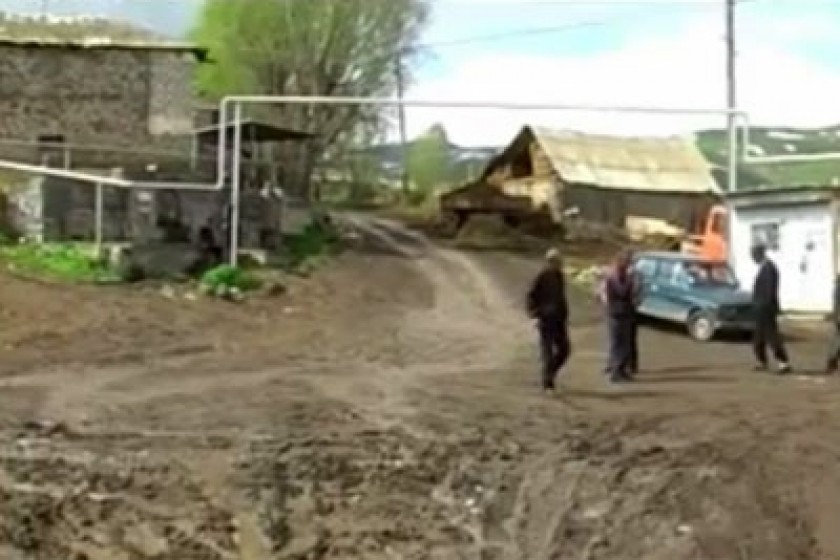
Moutsk: Only the Elderly Remain in Village Bordering Nakhichevan (Video)
By Armen Hovakimyan
59 year-old Razmik Simonyan, a resident of the village of Moutsk, hasn’t put down his shepherd’s crook foe 30 years.
He spends most of his days in the hills, accompanied by his trusty dog Arjouk.
Razmik’s son and daughter have long since married and moved away. He and his wife see the kids and grandchildren from time to time, but miss them greatly.
Razmik doesn’t pay too much attention to politics. Instead, he plans in detail how to run the household, making sure the sheep give birth twice a year and that the cheese and matzoun made from their milk is the best in the village.
Moutsk, located 26 kilometres from Sisian in Armenia’s Syunik Marz, is located on the border with Nakhichevan. The village lies 2,000 meters above sea level.
75 year-old Rouben and his 70 year-old wife also live in Moutsk. They stay busy raising some animals and working the land.
“We keep watch on the border. Anything happens, we’re the first to raise the alarm,” says Rouben Alaverdyan.
Villagers in Moutsk face a tough life. There’s no farm equipment for the spring planting.
When harvest time rolls around, Rouben and his wife Roza, are helped by their son who drives a taxi in Yerevan and their daughter’s family who live in Sisian.
“A house needs young folk to help out with the work, both summer and winter,” Roza says.
But the couple can’t imagine leaving the village. It’s where the family hearth is and where their ancestors are buried.
Moutsk is a village that’s seen better days. The young are steadily leaving for greener pastures.
The roads are nearly impassable due to the mud of the spring rains and the deep winter snow.
“It used to be a big village with a rich harvest. But now, no one pays attention to our problems. The youth have left,” says 90 year-old Moushegh Paonyan.
One of the young people who remains is 22 year-old Aramayis. He occasionally leaves the village to find work but always returns. His parents live alone. Aramayis still hasn’t thought about getting married.
“There are the animals and we grow potatoes. But, it’s not enough to keep us afloat. How can I think about getting married if there’s no work around?” says Aramayis with a smile.
Village Mayor Drastamat Navasardyan says no interest or low interest loans must be made available to encourage the young residents to stay in Moutsk.
Village deaths now surpass the number of marriages and there are no births no speak of. The school only has 4 pupils.
Mayor Navasardyan says the population of the village has shrunk by 50% when a head count was taken for the 2007 parliamentary elections.
“We used to have 400 residents and now it’s dropped to 200. School enrollment has dropped from 70 to 4,” he notes.
Navasardyan was first elected mayor in 1996 and has been re-elected ever since.
He fondly remembers the Soviet days when the flocks were large and there was adequate equipment for farming.
The village is ringed with red clay deposits. Prior to the 1950s, there was a small plant producing bricks and tiles from the local clay.
It too is a long lost memory.
 Videos
Videos Photos
Photos
Write a comment